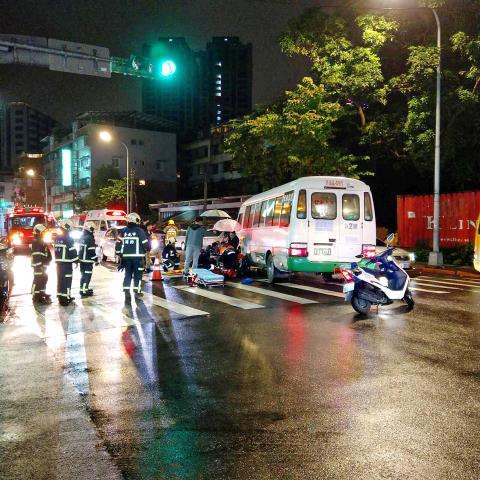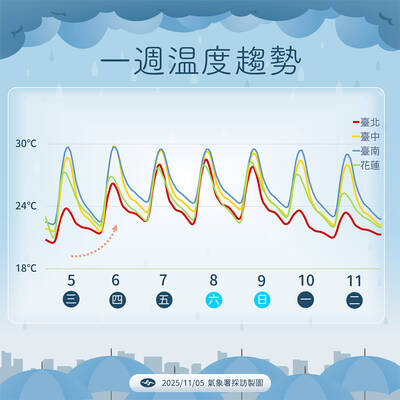A total of 65 deaths occurred within 24 hours of a traffic accident last year in Taipei, the lowest rate in 20 years, the Taipei Department of Transportation said yesterday.
That was a nearly 27 percent decrease from the 89 deaths in 2016, the agency said, but added that small vehicles, with 29 deaths, still caused the greatest number of fatal accidents.
Only about 2 percent of the fatal accidents were caused by drunk driving, the agency said.

Photo: CNA
Of the 65 people that died, 30 were motorcycle riders or passengers, 28 were pedestrians, three were car drivers or passengers, three were cyclists and one was a truck driver or passenger, it said.
Last year, motorcyclist deaths were spread across three age groups: 18 to 25-year-olds (five people), 40 to 49-year-olds (seven people) and 50 to 59-year-olds (five people), the agency said.
In previous years, more than 70 percent of motorcyclist deaths were concentrated in the 18 to 25-year-old group, it added.
Pedestrian deaths were concentrated among those older than 65 (20 people), the agency said, adding that deaths in the car driver or passenger category and cyclist category did not show clear trends.
A total of 28,773 people were injured in the 37,690 traffic accidents that were recorded last year, the department said.
Last year, the department reviewed locations that easily led to accidents or deaths, but also mailed traffic safety pamphlets to the residences of those older than 75, the agency said when asked why the number of accidents had decreased.
The department said it also held forums targeting motorcyclists in the 18 to 25-year-old group at colleges and universities.
It also implemented an ad hoc law enforcement plan to strengthen the use of speed cameras and mobile speed controls for motorcycles at times and locations that motorcyclists were likely to cause accidents, it added.
The Ministry of Transportation and Communications uses deaths within 30 days of traffic accidents, rather than deaths within 24 hours, as the standard for its statistics on fatalities and injuries caused by traffic accidents.
The numbers for the whole of last year are still being calculated, the department said, but added that from January to October, 118 deaths occurred within 30 days of a traffic accident, which is still a decrease compared with the 161 deaths in 2015.

Three Taiwanese airlines have prohibited passengers from packing Bluetooth earbuds and their charger cases in checked luggage. EVA Air and Uni Air said that Bluetooth earbuds and charger cases are categorized as portable electronic devices, which should be switched off if they are placed in checked luggage based on international aviation safety regulations. They must not be in standby or sleep mode. However, as charging would continue when earbuds are placed in the charger cases, which would contravene international aviation regulations, their cases must be carried as hand luggage, they said. Tigerair Taiwan said that earbud charger cases are equipped

Foreign travelers entering Taiwan on a short layover via Taiwan Taoyuan International Airport are receiving NT$600 gift vouchers from yesterday, the Tourism Administration said, adding that it hopes the incentive would boost tourism consumption at the airport. The program, which allows travelers holding non-Taiwan passports who enter the country during a layover of up to 24 hours to claim a voucher, aims to promote attractions at the airport, the agency said in a statement on Friday. To participate, travelers must sign up on the campaign Web site, the agency said. They can then present their passport and boarding pass for their connecting international

UNILATERAL MOVES: Officials have raised concerns that Beijing could try to exert economic control over Kinmen in a key development plan next year The Civil Aviation Administration (CAA) yesterday said that China has so far failed to provide any information about a new airport expected to open next year that is less than 10km from a Taiwanese airport, raising flight safety concerns. Xiamen Xiangan International Airport is only about 3km at its closest point from the islands in Kinmen County — the scene of on-off fighting during the Cold War — and construction work can be seen and heard clearly from the Taiwan side. In a written statement sent to Reuters, the CAA said that airports close to each other need detailed advanced

UNKNOWN TRAJECTORY: The storm could move in four possible directions, with the fourth option considered the most threatening to Taiwan, meteorologist Lin De-en said A soon-to-be-formed tropical storm east of the Philippines could begin affecting Taiwan on Wednesday next week, the Central Weather Administration (CWA) said yesterday. The storm, to be named Fung-wong (鳳凰), is forecast to approach Taiwan on Tuesday next week and could begin affecting the weather in Taiwan on Wednesday, CWA forecaster Huang En-hung (黃恩鴻) said, adding that its impact might be amplified by the combined effect with the northeast monsoon. As of 2pm yesterday, the system’s center was 2,800km southeast of Oluanbi (鵝鑾鼻). It was moving northwest at 18kph. Meteorologist Lin De-en (林得恩) on Facebook yesterday wrote that the would-be storm is surrounded by